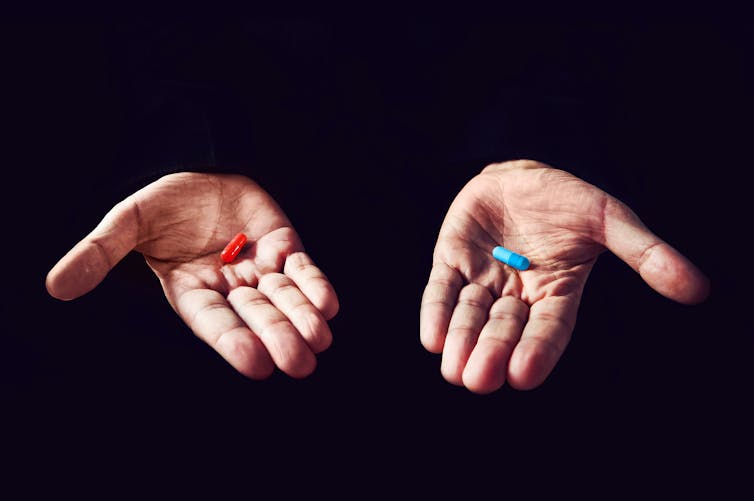Thot. White knight. Red pilled. Cuck. Beta. Soyboy. Unicorn. Chad.
To many people, these words won’t mean much. To others, they are a core part of the vocabulary of the “manosphere” – a collection of websites, social media accounts and forums dedicated to men’s issues, from health and fitness to dating and men’s rights.
Many (though not all) manosphere communities have become spaces where explicit anti-women and anti-feminist sentiment abound. These include incels, men’s rights activists, red-pillers, pick-up artists and male separatists.
I’m interested in how men use language, especially in the media and online, and what this tells us about contemporary masculinity and gender relations. In my recent book, I show how the language of the manosphere creates a culture of exclusion, denigration (mainly of women, but also of other men), male power and entitlement.
Understanding what manosphere terms mean can help teachers and parents start conversations with young men who are engaging with manosphere and male supremacist content. Recognising how language and ideology are connected can help with deradicalisation efforts, or ideally prevent radicalisation in the first place. And for young men and boys themselves, this awareness can improve their digital literacy and help them resist manipulation.
For police and other authorities, language can be an early warning system to identify men at risk of carrying out male supremacist violence. Tragedies in Isla Vista, Oregon, Toronto, Tallahassee and Plymouth were all prefaced by the perpetrators publishing male supremacist and incel content.
It is difficult to give a comprehensive overview of every instance of manosphere language. It is a constantly evolving collection of terms, sometimes in response to new issues that emerge, or in an attempt to subvert social media moderation efforts (abbreviations and acronyms are good examples of this). Here are some key terms to know.
Red and blue pill
The cyberpunk blockbuster The Matrix is the source of a key symbol in the manosphere – the red pill. In the film, protagonist Neo is offered a choice of two pills. If he takes the blue pill, he will continue to exist in the world as he knows it, which is actually a simulation controlled by sentient machines who have enslaved humanity as a power source. If he takes the red pill, he will be released into the “real world”, where the curtain is pulled back and the truth is revealed.
In the manosphere, those who have been “red-pilled” see the world as it really is, understanding the so-called “real” nature of women’s behaviour and dating preferences. As researchers Megan Kelly, Alex DiBranco and Julia DeCook write:
Red pillers awaken to the “truth” that socially, economically and sexually, men are at the whims of women’s (and feminists’) power and desires.
The pill symbolism has also been taken up by the alt-right and cuts across a variety of conspiracy theories, from the claim of feminism controlling the world to shadowy global elites influencing public opinion.

Alphas and betas
The manosphere is obsessed with status, power, prestige and hierarchy. The idea of alphas and betas is central to this. Originally developed by biologist David Mech in his early work on wolf packs, the “alpha” was argued to be the most socially dominant male. Mech has since refuted this account as overly simplistic.
The concept was co-opted by the seduction community, a community organised around sharing tips and guidance for attracting and seducing women, before making its way to other parts of the manosphere.
Becoming an alpha is an aspirational goal for many men who engage with manosphere content. Alphas are in charge, have their pick of sexual partners and have ultimate control, both of themselves and others. Betas are the polar opposite: physically and psychologically weak, sexually unattractive, timid, submissive, meek and generally lacking in the qualities necessary to attain “real” manhood.
Chads and Stacys
The hierarchy of the manosphere, and the claimed primacy of looks over personality, can be clearly seen in the caricatures of Chads and Stacys.
Chads are the “ultimate alpha” – the ultra-masculine, virile, powerful and sexually attractive man to whom Stacys and other women flock. The term “gigachad” refers to the most alpha of alpha males.
Stacys are an idealisation of femininity – a hyper-attractive, sexually desirable, promiscuous but vapid woman. She is ultimately unobtainable, especially to men who are not Chads. Simultaneously the objects of disdain and desire, Chads and Stacys highlight a clichéd view of men and women, rooted in stereotypes and pigeonholes rather than in reality.

Cuck
Shortened from cuckold, meaning a man whose wife has been unfaithful (a term first used as early as 1250), cuck is widely used in the manosphere and alt-right spaces.
The term is strongly associated with a subgenre of “humiliation pornography”, in which a man derives sexual pleasure from watching his female partner have sex with another man. Cuck is often used as an insult, especially since the idea of allowing one’s partner to have consensual sex with other men goes against heteronormative notions of male sexuality, control and ownership.
In some cases, such pornography also has an interracial dimension, contributing to racist stereotypes of Black men’s hypersexuality and hyperphysicality. Linguist Maureen Kosse has written about how cuck is used to “spread covertly racist online discourse by cloaking medieval sexual logic and racial anger in misogynistic humor”.
(N)awalt
(N)awalt means “(not) all women are like that”. The more common form “Awalt” is typically used to ascribe negative stereotypes to women. Denying their individuality, Awalt is used to suggest women are all vapid, insincere, sexually promiscuous, driven by emotions rather than rationality, motivated by financial gain and more. Awalt is also deployed to emphasise the claim that men are everything women are not – moral, rational, intelligent, loyal, honourable and individualistic.
It is clear that manosphere language is contributing to an increasingly politicised and fractious form of gender relations. By understanding this language, we can better counter it.

